


Travel agency management system is a cornerstone for organizing, streamlining, and optimizing operations in the travel industry. However, to truly harness its potential and maximize efficiency, it’s essential to grasp some insider tips and tricks. Here’s your guide to getting the most out of your travel agency management software.
Before delving into the nuances of optimization, it’s crucial to start with the right foundation: choosing the appropriate travel agency software. Look for features tailored to your agency’s needs, such as booking management, itinerary planning, CRM integration, and reporting capabilities. Opting for customizable solutions ensures scalability as your business grows.
Integrating your travel agency management system with Customer Relationship Management (CRM) systems enhances workflow efficiency by centralizing client data. This integration allows for personalized communication, targeted marketing campaigns, and comprehensive client management, ultimately fostering stronger client relationships and boosting sales.
Take advantage of automation features within your software to streamline routine tasks and reduce manual workload. From automating booking confirmations and payment reminders to generating customized reports, automation frees up valuable time for your team to focus on delivering exceptional service and cultivating client relationships.
Data is a goldmine of insights waiting to be unearthed. Utilize analytics tools within your travel booking management software to gain a deeper understanding of client preferences, booking trends, and revenue streams. By analyzing this data, you can make informed decisions, tailor marketing strategies, and identify areas for improvement, driving business growth and profitability.
Investing in comprehensive training for your team ensures proficient utilization of your travel agency software. Additionally, prioritize ongoing support from your software provider to address any queries or issues promptly. A well-trained and supported team maximizes software utilization, minimizes errors, and enhances overall user experience.
Technology evolves rapidly, and so should your software for travel companies. Regularly update your software to access new features, security enhancements, and performance optimizations. Staying abreast of the latest updates ensures your agency remains competitive in a dynamic industry landscape.
Protecting sensitive client data is paramount in the travel industry. Implement robust security measures within your travel agency management software, such as data encryption, access controls, and regular security audits. Prioritizing data security not only safeguards your clients’ trust but also ensures compliance with industry regulations.
Effective communication is the cornerstone of teamwork. Utilize collaboration features within your travel agency management software to facilitate seamless communication and task delegation among team members. By fostering a collaborative environment, you can enhance productivity, streamline processes, and deliver exceptional service to your clients.
In a rapidly evolving industry, adaptability is key to success. Choose a software for travel companies that offers flexibility and scalability to accommodate changing business needs and industry trends. Embrace innovation, stay nimble, and continuously seek opportunities for improvement to stay ahead of the curve.
In today’s interconnected world, mobility is no longer a luxury but a necessity. Opt for Tour agency management software that offers mobile accessibility, allowing you and your team to access critical information and manage operations anytime, anywhere. Mobile functionality empowers you to stay responsive to client needs and seize business opportunities on the fly.
Every client is unique, and personalization is paramount in the travel industry. Leverage client profiles within your travel management software to store preferences, travel history, and special requirements. By tailoring recommendations and experiences to individual preferences, you can exceed client expectations and foster long-term loyalty.
Feedback is invaluable for driving continuous improvement. Encourage clients to provide feedback on their experiences using your travel agency management software and services. Use this feedback to identify pain points, address issues, and implement enhancements that elevate the client experience and differentiate your agency from competitors.
The travel industry is undergoing rapid transformation, driven by technological advancements and shifting consumer behaviors. Future-proof your business by embracing innovation and exploring emerging technologies that enhance operational efficiency, elevate customer experiences, and position your agency for long-term success.
Choosing the right travel agency management software involves assessing your agency’s specific needs and requirements. Start by identifying the key functionalities you need, such as booking management, CRM integration, reporting capabilities, and scalability. Research different software options, read reviews, and consider factors like user-friendliness, customer support, and pricing. Opt for a solution that aligns with your agency’s goals and growth trajectory.
Integrating travel agency management software with Customer Relationship Management (CRM) systems offers several benefits. It centralizes client data, allowing for personalized communication, targeted marketing campaigns, and comprehensive client management. By synchronizing data between the two systems, you can enhance client relationships, improve sales and marketing efficiency, and deliver tailored experiences that meet individual client needs.
Automation features within travel agency management software streamline routine tasks and reduce manual workload, freeing up time for your team to focus on high-value activities. Tasks such a travel booking confirmations, payment reminders, and report generation can be automated, improving efficiency, accuracy, and productivity. Automation also minimizes errors and ensures consistency in operations, leading to enhanced client satisfaction and loyalty.
Analytics tools within travel agency management software provide valuable insights into client preferences, booking trends, revenue streams, and operational performance. You can analyze data to identify emerging trends, track key performance indicators, and make data-driven decisions to optimize business operations. These insights help you tailor marketing strategies, improve service offerings, and identify opportunities for growth and expansion.
Ongoing training and support are crucial for maximizing the utilization of travel agency management software. Comprehensive training ensures that your team understands how to effectively use the software’s features and functionalities. Additionally, having access to prompt and knowledgeable support from the software provider helps address any issues or queries that may arise, minimizing downtime and ensuring smooth operations.
Protecting client data is paramount in the travel industry. Prioritize security measures such as data encryption, access controls, and regular security audits to safeguard sensitive information. Ensure that your travel agency management software complies with industry regulations and standards for data protection and privacy. Implementing robust security measures instills trust and confidence in your clients and strengthens your agency’s reputation for professionalism and integrity.
In conclusion, optimizing your travel agency management software is essential for maximizing efficiency, enhancing client experiences, and driving business growth. By following these insider tips and leveraging the full potential of your software, you can streamline operations, foster client loyalty, and stay ahead of the competition in an ever-evolving industry landscape.

In today’s fast-paced travel industry, managing operations efficiently is paramount for the success of travel agencies. The advent of technology has revolutionized the way agencies operate, with travel agency management software playing a crucial role in streamlining processes and enhancing customer experiences. In this article, we delve into the world of travel agency management software, exploring its benefits, key features, challenges faced by agencies, and insights from industry leaders.
Travel agency management software is a comprehensive solution designed to automate and streamline various aspects of travel agency operations. From booking and reservation management to accounting and customer relationship management, these software platforms offer a wide range of functionalities to simplify tasks and improve efficiency. By centralizing data and automating routine processes, management software enables agencies to focus more on delivering exceptional service to their clients.
The adoption of travel agency management software brings forth a myriad of benefits for agencies. Firstly, it allows for the automation of repetitive tasks, freeing up valuable time that can be allocated to more strategic activities. Additionally, these software solutions help in enhancing the overall customer experience by providing personalized service, efficient communication channels, and timely updates on travel arrangements. Moreover, management software provides valuable insights through data analytics, enabling agencies to make informed decisions and optimize their operations for better results.
When selecting a travel agency management software, it’s essential to consider certain key features to ensure that it meets the specific needs of the agency. These features may include booking management, itinerary planning, invoicing and billing, CRM functionality, reporting and analytics, and integration capabilities with other systems. A user-friendly interface and responsive customer support are also crucial factors to consider when evaluating management software options.
Despite the numerous benefits offered by management software, travel agencies also encounter various challenges in the industry. Competition from online travel agencies, fluctuating market trends, and regulatory compliance are some of the common hurdles faced by agencies. Additionally, the complexity of travel arrangements and the need to stay updated with changing customer preferences pose significant challenges for agencies striving to maintain a competitive edge in the market.
Industry leaders employ various strategies and solutions to navigate the challenges faced by travel agencies. This may include investing in advanced technology solutions, diversifying service offerings, and focusing on niche markets. Building strong partnerships with suppliers and leveraging data analytics to understand customer behavior are also key strategies adopted by industry leaders to stay ahead of the curve.
The future of travel agency management software is shaped by emerging trends and innovations in the industry. Artificial intelligence, machine learning, and predictive analytics are increasingly being integrated into management software platforms to enhance decision-making capabilities and personalize customer experiences. Moreover, the shift towards mobile-first solutions and the rise of virtual reality in travel planning are expected to further revolutionize the way agencies operate in the coming years.
To provide valuable insights into the world of travel agency management software, we reached out to industry leaders for their perspectives and advice. Here are some key takeaways from our expert roundup:
John Smith, CEO of Travel Tech Solutions : “In today’s digital age, agility and innovation are paramount for travel agencies. Investing in advanced management software can significantly improve operational efficiency and enable agencies to adapt to changing market dynamics.”
Sarah Johnson, COO of Global Travel Services: “Customer experience is at the heart of everything we do. By leveraging data-driven insights and adopting a customer-centric approach, agencies can build lasting relationships with their clients and drive loyalty.”
Michael Chang, Director of Sales at Wanderlust Travel Agency: “Integration is key to success in the travel industry. Look for management software that seamlessly integrates with other systems, such as booking engines and payment gateways, to streamline operations and enhance productivity.”
Travel business solutions software typically includes features such as booking management, itinerary planning, invoicing and billing, customer relationship management (CRM), reporting and analytics, and integration capabilities with other systems. These features are designed to automate and streamline various aspects of agency operations, improving efficiency and enhancing the overall customer experience.
Travel agency software improves customer satisfaction by enabling agencies to provide personalized service, efficient communication channels, and timely updates on travel arrangements. With features like Travel CRM functionality and data analytics, agencies can better understand their customers’ needs and preferences, allowing them to tailor their services accordingly and deliver exceptional experiences.
While the necessity may vary depending on the size and scale of the agency, investing in management software can offer significant benefits even for small agencies. By automating routine tasks and centralizing data, management software allows small agencies to operate more efficiently, compete effectively in the market, and deliver better service to their clients.
Some potential challenges of implementing travel software include the initial cost of investment, training staff to use the new system effectively, and ensuring smooth integration with existing systems and processes. Additionally, agencies may face resistance to change from employees accustomed to traditional methods of operation.
Yes, several trends are shaping the future of management software in the travel industry. These include the integration of artificial intelligence (AI) and machine learning to enhance decision-making capabilities, the shift towards mobile-first solutions to cater to the increasing use of smartphones and tablets, and the adoption of virtual reality (VR) technology for immersive travel experiences.
Agencies can ensure data security when using management software by implementing robust security measures such as encryption, access controls, and regular security audits. It’s also essential to choose reputable software vendors who prioritize data protection and compliance with industry regulations such as GDPR (General Data Protection Regulation). Additionally, training staff on data security best practices and maintaining up-to-date software can help mitigate potential risks.
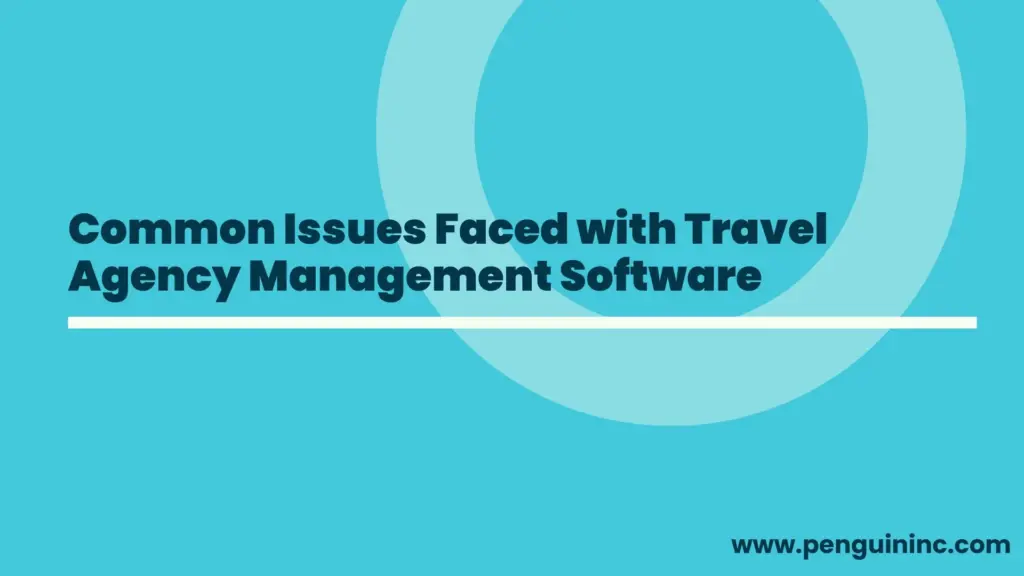
Are you struggling with Travel Agency Management Software? Dive into this comprehensive troubleshooting guide, covering common issues and their solutions.
Navigating through the intricacies of Travel Agency Management Software can sometimes feel like deciphering a complex puzzle. From booking glitches to payment processing hiccups, the challenges can be overwhelming. This guide aims to unravel the common issues faced with Travel Agency Management Software and provide practical solutions for smoother operations.
The first hurdle often encountered is navigating the software interface effectively. Familiarizing yourself with the layout, menu options, and functions is crucial for efficiency. Take your time exploring each feature to maximize productivity and minimize errors.
Booking errors can lead to frustrated customers and lost revenue. Whether it’s double bookings, incorrect dates, or mismatched details, resolving these issues promptly is paramount. Ensure that all booking information is accurate before confirming reservations to avoid inconvenience later.
Payment processing glitches can disrupt the flow of transactions, causing delays and dissatisfaction among clients. Whether it’s declined payments, processing errors, or system crashes, staying vigilant and having contingency plans in place can mitigate these challenges.
Integrating Travel Agency Management Software with third-party platforms is common but can sometimes result in compatibility issues. Whether it’s syncing data or accessing APIs, troubleshooting integration problems promptly ensures seamless operations across all platforms.
Optimizing the performance of Travel Agency Management Software is essential for efficiency and customer satisfaction. Regular updates, system checks, and performance tuning can prevent lagging, crashes, and other performance-related issues.
Security Measures: Protecting sensitive data is paramount in the travel industry. Addressing data security concerns such as unauthorized access, data breaches, and compliance with regulations ensures the trust and confidence of both clients and stakeholders.
Troubleshooting Guide: Common Issues Faced with Travel Agency Management SoftwareNavigating the complexities of Travel Agency Management Software can be challenging, but with the right approach, common issues can be resolved effectively. Here’s a troubleshooting guide to address some frequently encountered problems.
Ensure all booking information is accurate before confirming reservations. Double-check dates, names, and other details to minimize errors.
Check for any technical issues, such as connectivity problems or system errors. Contact your payment processor for assistance and consider alternative payment methods if necessary
Review integration settings and configurations to ensure compatibility. Check for updates or patches that may address compatibility issues, and reach out to the third-party provider for support if needed.
Regularly update the software, perform system checks, and optimize settings for better performance. Consider upgrading hardware or software components if performance issues persist.
Implement robust security measures such as encryption, access controls, and regular security audits. Stay informed about emerging threats and compliance requirements to safeguard sensitive data effectively.
Develop contingency plans and protocols for addressing common software issues promptly. Provide training and support to staff members to handle issues effectively and minimize disruptions.
In conclusion, navigating the challenges of Travel Agency Management Software requires patience, diligence, and proactive problem-solving. By understanding common issues and implementing effective troubleshooting strategies, you can streamline operations, enhance customer satisfaction, and propel your travel agency towards success.
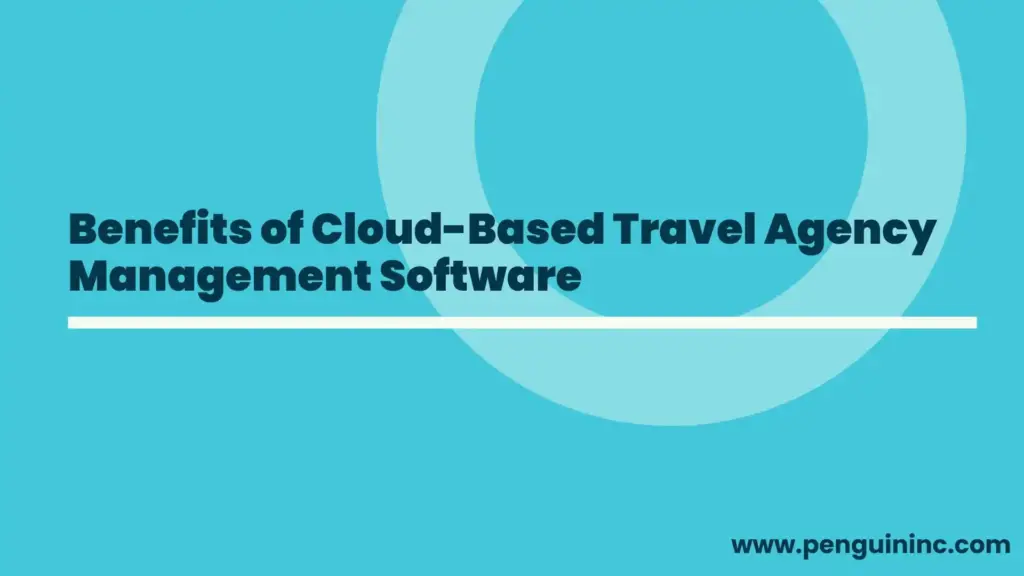
Discover the myriad advantages of utilizing cloud-based Travel Agency Management Software. Streamline your operations, enhance accessibility, and elevate your travel agency’s efficiency with this innovative solution.
In the ever-evolving landscape of travel agency management, staying ahead requires embracing cutting-edge technology. One such innovation that has revolutionized the industry is cloud-based Travel Agency Management Software. This article delves into the numerous benefits that this software offers, empowering travel agencies to thrive in a competitive market.
Accessibility: Cloud-based software offers unparalleled accessibility, allowing travel agents to manage operations from anywhere with an internet connection. Whether it’s responding to client inquiries on the go or accessing booking information remotely, the cloud ensures flexibility and convenience.
Scalability: Traditional software solutions often come with limitations in terms of scalability. In contrast, cloud-based Travel Agency Management Software scales seamlessly with the growing needs of your business. Whether you’re a small agency or a large enterprise, you can adapt your software usage and pricing accordingly.
Real-Time Updates: With cloud-based software, updates are automatic and seamless, ensuring that your system is always up to date with the latest features and security patches. Additionally, the cloud facilitates real-time collaboration among team members, enhancing communication and productivity.
Security Measures: Cloud-based solutions prioritize data security, implementing robust encryption protocols and access controls to safeguard sensitive information. Furthermore, automated backup mechanisms ensure that your data is protected against loss or corruption, providing peace of mind to both clients and stakeholders.
Operational Efficiency: By centralizing data and automating repetitive tasks, cloud-based Travel Agency Management Software streamlines operations and eliminates manual errors. From booking management to invoicing and reporting, the software enhances efficiency at every stage of the workflow.
Customer Experience: Ultimately, the primary goal of any travel agency is to deliver exceptional service and experiences to clients. Cloud-based software empowers agents to focus on personalized service, responsive communication, and tailored recommendations, thereby enhancing customer satisfaction and loyalty.
In conclusion, cloud-based Travel Agency Management Software offers a multitude of benefits that can revolutionize the way travel agencies operate. From enhanced accessibility and scalability to improved efficiency and customer satisfaction, the advantages are undeniable. By embracing this innovative solution, travel agencies can stay agile, competitive, and poised for success in a rapidly evolving industry.
Cloud-based Travel Agency Management Software is a digital solution hosted on remote servers and accessed via the internet. It allows travel agencies to manage their operations, bookings, and customer interactions from anywhere with an internet connection.
Cloud-based software offers unparalleled accessibility, enabling travel agents to manage operations remotely. Whether it’s responding to client inquiries on the go or accessing booking information from a different location, the cloud ensures flexibility and convenience.
Cloud-based solutions are highly scalable, accommodating the growing needs of travel agencies. Whether you’re a small agency or a large enterprise, you can easily adjust your software usage and pricing to match your business requirements.
Cloud-based solutions prioritize data security, implementing robust encryption protocols and access controls to protect sensitive information. Additionally, automated backup mechanisms ensure that data is protected against loss or corruption.
Cloud-based software facilitates real-time updates, ensuring that systems are always up to date with the latest features and security patches. Furthermore, it enables seamless collaboration among team members, enhancing communication and productivity.
By centralizing data and automating repetitive tasks, cloud-based software streamlines operations and eliminates manual errors. From booking management to invoicing and reporting, the software enhances efficiency at every stage of the workflow.
Cloud-based software empowers travel agents to focus on personalized service, responsive communication, and tailored recommendations. By enhancing customer experience, it leads to increased satisfaction and loyalty among clients.
Discover how travel agency management software can revolutionize customer service, enhancing efficiency and satisfaction. Explore its benefits and impact now!
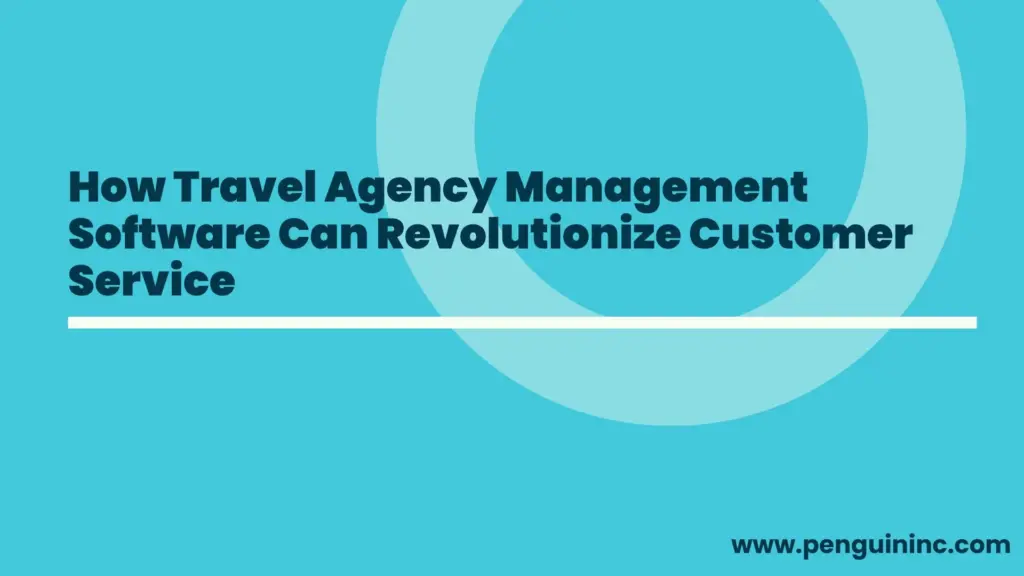
In today’s fast-paced world, customer service plays a pivotal role in determining the success of any business, especially in the travel industry. With the advent of technology, travel agencies are increasingly turning to management software solutions to streamline operations and enhance customer experiences. In this article, we’ll delve into how travel agency management software can revolutionize customer service, providing insights into its benefits, functionalities, and impact on the industry.
In the competitive landscape of the travel industry, efficiency is key to staying ahead. Travel Agency Management Software: A Game Changer explores how modern software solutions are transforming the way travel agencies operate. From itinerary planning to booking management, these platforms automate repetitive tasks, allowing agents to focus on delivering personalized service to clients.
Customer satisfaction is the cornerstone of success in the travel business. Revolutionizing Customer Service Through Technology discusses how management software enables agencies to offer seamless experiences to travelers. With features such as real-time updates, personalized recommendations, and 24/7 support, agencies can cater to the diverse needs of their clientele, fostering long-term loyalty and positive word-of-mouth.
In a market saturated with options, personalized service sets businesses apart. Tailored Experiences for Every Traveler explores how management software empowers agencies to create customized itineraries and recommendations based on individual preferences and past behaviors. By harnessing data analytics and machine learning, agencies can anticipate customer needs, delivering unparalleled service that exceeds expectations.
Time is of the essence in the travel industry, and manual processes can impede productivity. Automating Tasks for Optimal Efficiency highlights how management software automates routine tasks such as booking confirmations, itinerary updates, and payment processing. By eliminating manual errors and reducing turnaround times, agencies can optimize their workflow and provide a seamless experience for both clients and staff.
Knowledge is power, especially in a dynamic industry like travel. Harnessing Data for Informed Decision-Making explores how management software provides agents with real-time insights into market trends, customer preferences, and competitive landscapes. By leveraging data analytics and reporting tools, agencies can make informed decisions that drive business growth and enhance customer satisfaction.
In today’s digital age, travelers expect seamless access to information and services. Accessible Solutions for Modern Travelers discusses how management software offers multi-channel accessibility, allowing customers to interact with agencies through various touchpoints such as websites, mobile apps, and social media platforms. By providing round-the-clock support and self-service options, agencies can cater to the diverse needs of today’s tech-savvy travelers.
Innovation is the lifeline of the travel industry, driving evolution and growth. Embracing Innovation for Future Success explores how management software fosters a culture of innovation within agencies, enabling them to adapt to changing market dynamics and emerging trends. By continuously updating and enhancing their software solutions, agencies can stay ahead of the curve and deliver cutting-edge experiences that resonate with modern travelers.
Travel agency management software levels the playing field for small agencies by automating tasks, streamlining operations, and enhancing customer service, allowing them to compete effectively with larger players.
Yes, most modern travel agency management software solutions offer seamless integration with third-party systems such as booking engines, payment gateways, and accounting software, enabling agencies to streamline their workflow and maximize efficiency.
Travel management software prioritizes data security and compliance, implementing robust encryption protocols, access controls, and regular audits to safeguard sensitive customer information from unauthorized access or breaches.
Travel agency management software facilitates collaboration among team members through features such as centralized communication channels, task assignment, and shared calendars, fostering transparency, accountability, and teamwork.
Yes, most providers offer comprehensive training programs and ongoing support to help agencies onboard staff and maximize the value of their software investment, ensuring a smooth transition and optimal utilization of features.
Absolutely, travel agency management software often includes compliance features such as GDPR readiness, PCI DSS compliance, and regulatory updates, helping agencies stay abreast of evolving regulations and maintain industry standards.
In conclusion, travel agency management software represents a paradigm shift in the way travel agencies deliver customer service, empowering them with innovative tools and capabilities to enhance efficiency, engagement, and satisfaction. By embracing technology and prioritizing customer-centric solutions, agencies can revolutionize the travel experience, driving growth and success in an ever-evolving industry.
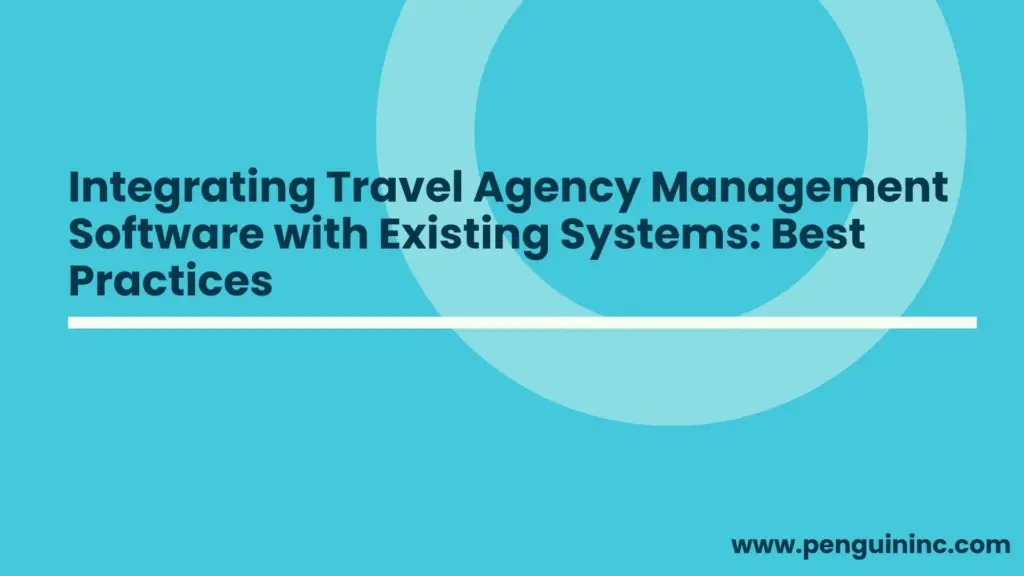
In today’s fast-paced travel industry, integrating management software with existing systems is crucial for enhancing efficiency and streamlining operations. This comprehensive guide unveils the best practices to seamlessly integrate travel agency management software with your current systems, ensuring optimal performance and workflow.
In the dynamic realm of travel agencies, where time is of the essence and precision is paramount, leveraging the power of management software can be a game-changer. However, integrating new software with existing systems can pose challenges if not approached strategically. This article delves into the strategies and best practices to ensure a smooth integration process, empowering travel agencies to maximize productivity and deliver exceptional customer experiences.
Before delving into the integration process, it’s essential to gain a comprehensive understanding of the current systems in place and the specific requirements of the travel agency. Conducting a thorough assessment allows for identifying potential bottlenecks, compatibility issues, and areas for improvement
One of the primary considerations when integrating management software is ensuring compatibility with existing systems. Assessing the software’s compatibility matrix and conducting compatibility tests can preemptively address any interoperability issues, minimizing disruptions during the integration process.
Efficient data migration is critical for ensuring continuity of operations during the integration phase. Developing a robust data migration strategy involves categorizing data based on relevance, prioritizing essential datasets, and employing reliable migration tools to facilitate seamless transition without data loss or corruption.
Customizing the management software to align with the unique workflows and requirements of the travel agency is paramount for optimizing performance. From configuring user roles and permissions to tailoring reporting modules, customization ensures that the software seamlessly integrates into existing processes while enhancing efficiency.
Introducing new software entails empowering staff with the requisite skills and knowledge to leverage its full potential. Conducting comprehensive training sessions and providing ongoing support facilitates smooth adoption, mitigating resistance to change and maximizing the benefits of the integrated system.
Post-integration, continuous performance monitoring is essential for identifying areas of improvement and optimizing system functionality. Leveraging analytics tools to track key performance indicators (KPIs) allows for proactive intervention, ensuring that the integrated system operates at peak efficiency.
Integrating travel agency management software with existing systems requires a strategic approach and meticulous planning to ensure a seamless transition. By following these best practices, travel agencies can optimize efficiency, enhance productivity, and deliver unparalleled customer experiences.
The duration of the integration process varies depending on factors such as the complexity of existing systems, the scope of customization required, and the size of the agency. On average, integration can take anywhere from a few weeks to several months.
Common challenges include compatibility issues between software platforms, data migration complexities, resistance to change from staff, and ensuring uninterrupted operations during the transition phase.
Customization is highly recommended to tailor the software to the unique workflows and requirements of the agency. Customization enhances efficiency, improves user experience, and ensures seamless integration with existing systems.
Data security is paramount during integration. Implementing robust encryption protocols, access controls, and regular security audits can safeguard sensitive information and mitigate the risk of data breaches.
Ongoing support is crucial for addressing any technical issues, providing additional training as needed, and ensuring the smooth operation of the integrated system. Prompt support enhances user satisfaction and minimizes downtime.
Performance monitoring should be conducted regularly, ideally on a weekly or monthly basis, to track key metrics, identify areas for improvement, and optimize system performance accordingly.
In conclusion, integrating travel agency management software with existing systems is a strategic imperative for enhancing operational efficiency and delivering superior customer experiences. By following the outlined best practices and leveraging the insights gained from this guide, travel agencies can navigate the integration process with confidence, unlocking new levels of productivity and success.
Yes, most modern travel agency management software solutions offer seamless integration with third-party systems such as booking engines, payment gateways, and accounting software, enabling agencies to streamline their workflow and maximize efficiency.
Travel agency management software prioritizes data security and compliance, implementing robust encryption protocols, access controls, and regular audits to safeguard sensitive customer information from unauthorized access or breaches
Travel agency management software facilitates collaboration among team members through features such as centralized communication channels, task assignment, and shared calendars, fostering transparency, accountability, and teamwork.
Yes, most providers offer comprehensive training programs and ongoing support to help agencies onboard staff and maximize the value of their software investment, ensuring a smooth transition and optimal utilization of features.
Absolutely, travel agency management software often includes compliance features such as GDPR readiness, PCI DSS compliance, and regulatory updates, helping agencies stay abreast of evolving regulations and maintain industry standards
In conclusion, travel agency management software represents a paradigm shift in the way travel agencies deliver customer service, empowering them with innovative tools and capabilities to enhance efficiency, engagement, and satisfaction. By embracing technology and prioritizing customer-centric solutions, agencies can revolutionize the travel experience, driving growth and success in an ever-evolving industry.
Discover the myriad options available for customizing your travel agency management software in this detailed guide. From enhancing user experience to optimizing workflow efficiency, exploring customization options in travel agency management software is crucial for success in the competitive travel industry.
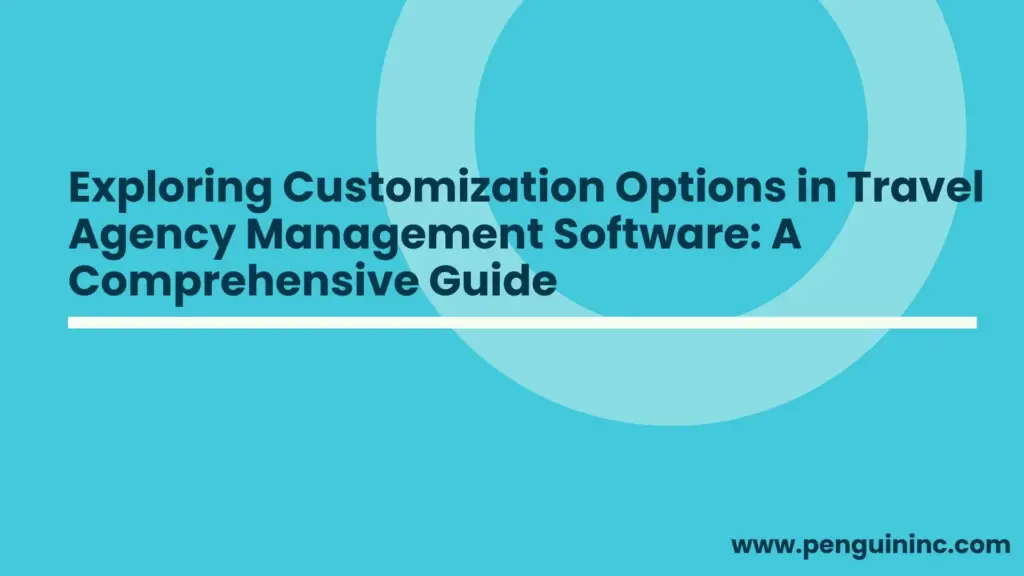
In today’s dynamic travel industry, staying ahead of the competition requires more than just offering great deals and destinations. It’s about providing exceptional service, streamlining operations, and delivering personalized experiences to clients. One key tool that empowers travel agencies to achieve these goals is robust management software. However, not all software solutions are created equal. The ability to customize your travel agency management software can make all the difference in maximizing efficiency, enhancing customer satisfaction, and ultimately boosting your bottom line.
Customization plays a pivotal role in tailoring your software to meet the unique needs and preferences of your travel agency. By leveraging customization options, you can:
Enhance User Experience: Customizing your software allows you to create intuitive interfaces tailored to your team’s workflow, improving usability and productivity.
Optimize Workflow Efficiency: Tailoring features and functionalities to align with your agency’s specific processes can streamline operations, saving time and reducing errors.
Personalize Customer Interactions: Customization enables you to collect and utilize customer data effectively, allowing for personalized communication, targeted marketing campaigns, and curated travel recommendations.
In today’s market, leading travel agency management software offers a plethora of customization options to suit diverse business needs. Let’s delve into some of the key customization features available:
A customizable dashboard allows you to configure the layout and widgets based on your preferences, providing quick access to vital metrics, upcoming bookings, and task lists. This personalized overview enhances efficiency by presenting relevant information at a glance.
Customizable booking workflows empower you to define and automate the booking process according to your agency’s requirements. From initial inquiry to final confirmation, you can customize each stage to align with your unique sales and service protocols.
Branding and white-labeling options enable you to customize the software with your agency’s logo, colors, and branding elements, reinforcing your brand identity across all client touchpoints.
Customizable reporting tools allow you to generate insightful reports tailored to your agency’s key performance indicators (KPIs). Whether you need financial reports, sales analytics, or client demographics, you can customize reports to extract actionable insights.
Leading travel agency management software offers seamless integration with third-party tools and services, allowing you to tailor your software stack to meet your specific needs. Whether it’s integrating with accounting software, CRM systems, or marketing platforms, customization options ensure smooth interoperability.
Customizable access control settings enable you to define user roles and permissions based on job responsibilities and seniority levels. This granular control ensures data security and confidentiality while empowering employees with the access they need to perform their roles effectively.
Tailoring your software with custom fields and data capture forms allows you to collect and organize client information according to your agency’s unique requirements. Whether it’s capturing travel preferences, loyalty program details, or special requests, customization options ensure you have the data you need to deliver personalized service.
Customizable notification settings enable you to automate client communications, sending timely reminders, updates, and personalized offers to enhance engagement and foster customer loyalty.
Yes, leading travel agency management software offers branding and white-labeling options, allowing you to customize the interface with your agency’s logo, colors, and branding elements for a seamless brand experience.
Customization allows you to tailor the software to align with your agency’s unique workflows and processes, streamlining operations, reducing manual tasks, and improving overall efficiency.
While most travel agency management software offers extensive customization options, it’s essential to review the features and limitations of each platform to ensure it meets your agency’s specific needs.
Yes, leading travel agency management software typically offers integration capabilities, allowing you to seamlessly connect with third-party tools and services such as accounting software, CRM systems, and marketing platforms.
You can typically update and modify customization settings as needed, ensuring your software evolves with your agency’s changing needs and preferences.
Many software providers offer comprehensive training and support resources to help users effectively customize and optimize their travel agency management software.
Exploring customization options in travel agency management software is essential for optimizing operations, enhancing customer experiences, and staying competitive in today’s dynamic market. By leveraging customizable features such as tailored workflows, branded interfaces, and integration capabilities, travel agencies can streamline processes, boost efficiency, and deliver personalized service that sets them apart from the competition.
Discover how travel agency management software enhances data security and protects sensitive information. Explore the robust security measures implemented to safeguard your agency’s data from cyber threats and breaches.
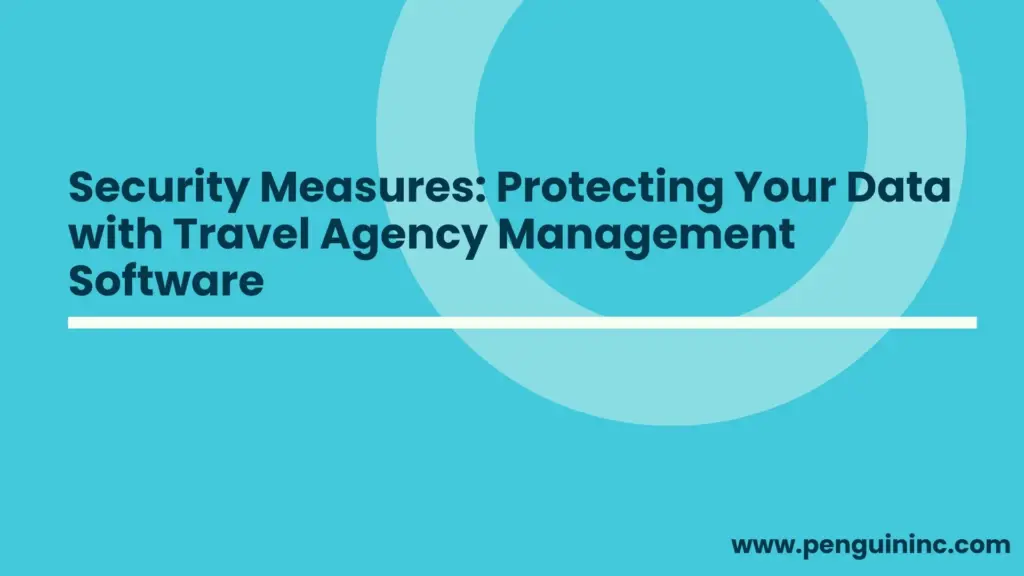
In today’s digital landscape, data security is paramount, especially for businesses handling sensitive information like travel agencies. As technology evolves, so do the threats to data integrity. Therefore, investing in robust security measures is crucial to safeguarding your agency’s data and maintaining customer trust. This article explores the security features and measures implemented in travel agency management software to protect your valuable data
Travel agency management software is designed not only to streamline operations but also to ensure the confidentiality, integrity, and availability of data. Here’s how these systems enhance data security:
Travel agency management software employs encryption protocols, secure authentication mechanisms, and regular security updates to safeguard against cyber threats such as data breaches and unauthorized access.
Yes, many travel agency management software solutions utilize secure cloud hosting environments provided by reputable vendors, ensuring the confidentiality and integrity of your agency’s data.
In addition to leveraging secure management software, implementing best practices such as employee training, network security protocols, and regular security audits can further enhance data security within your agency.
Yes, travel agency management system providers must adhere to industry-specific regulations such as GDPR and PCI DSS to ensure the protection of customer data and maintain compliance with data protection laws.
It’s essential to stay up-to-date with software updates and patches to mitigate security risks effectively. Regular updates are typically released by software providers to address emerging threats and vulnerabilities.
In the event of a security breach or data loss incident, it’s crucial to follow your agency’s established incident response plan, which may include steps such as notifying affected parties, conducting a thorough investigation, and implementing remedial actions to prevent future incidents.
Protecting your agency’s data is vital in today’s digital landscape, where cyber threats are ever-present. By leveraging the robust security measures and features offered by travel agency management software, you can safeguard sensitive information, maintain compliance with data protection regulations, and instill confidence in your clients. Prioritizing data security not only protects your agency’s reputation but also fosters trust and loyalty among your clientele.
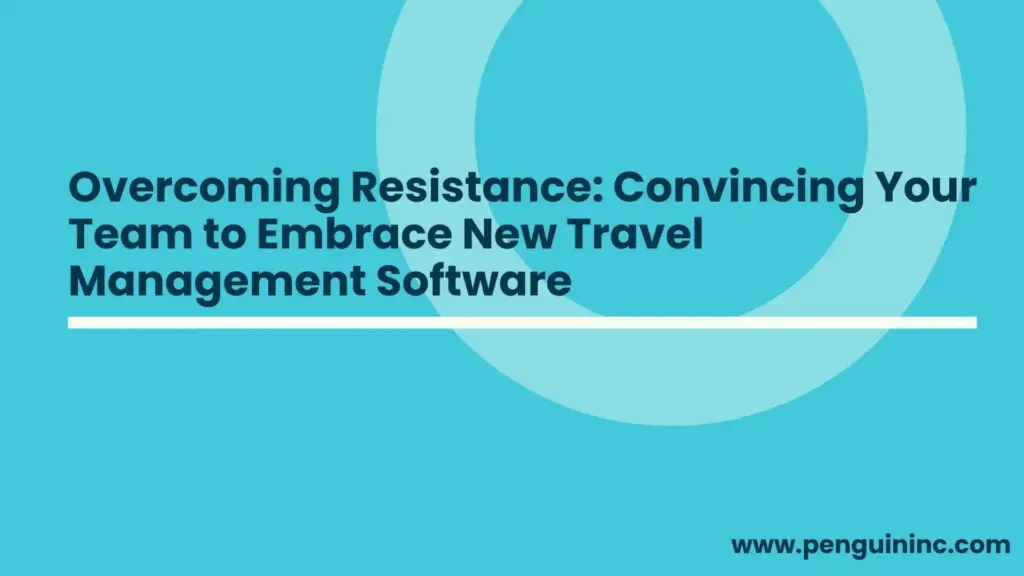
In today’s fast-paced business environment, embracing new technologies is paramount for staying competitive. One such technology that can revolutionize the travel agency process is advanced travel agency management system. However, convincing your team to adopt this new software might encounter resistance. This comprehensive guide will delve into various strategies and tactics to overcome resistance and effectively persuade your team to embrace new travel management software.
In this digital era, outdated manual travel management processes can hinder efficiency and productivity. Exploring the drawbacks of legacy systems and emphasizing the benefits of modernization can lay the groundwork for acceptance
Resistance to change can lead to stagnation and inhibit growth. Discussing the negative repercussions of maintaining status quo can motivate stakeholders to consider alternative solutions.
New software implementation often evokes fear and uncertainty among team members. Addressing common fears and misconceptions can alleviate concerns and pave the way for a smoother transition
Individuals may resist change due to familiarity and comfort with existing systems. Highlighting the limitations of current systems and showcasing the advantages of the new software can encourage openness to change.
Illustrating the specific features and benefits of the new travel management software can captivate interest and demonstrate its value proposition. Utilizing real-world examples and success stories can further reinforce the benefits.
Acknowledging existing pain points and challenges in the current travel management process can resonate with team members. Positioning the new software as a solution to these challenges can foster buy-in and enthusiasm.
Involving key stakeholders in the decision-making process from the outset can foster a sense of ownership and commitment. Hosting interactive workshops and soliciting feedback can cultivate a culture of collaboration.
Offering comprehensive training sessions and ongoing support resources can empower employees to navigate the transition with confidence. Investing in adequate training demonstrates a commitment to employee development and success.
Identifying potential objections and proactively addressing them can preemptively alleviate concerns. Creating FAQ documents and hosting Q&A sessions can provide clarity and reassurance.
Implementing pilot programs and showcasing early success stories can serve as tangible evidence of the new software’s effectiveness. Sharing testimonials from early adopters can build credibility and inspire confidence.
Defining measurable KPIs allows for objective evaluation of the software’s impact on business outcomes. Tracking metrics such as cost savings, time efficiency, and user satisfaction can quantify success.
Celebrating milestones and recognizing individual and team achievements can boost morale and reinforce positive behaviors. Implementing reward systems and acknowledging contributions fosters a culture of continuous improvement.
In conclusion, overcoming resistance and convincing your team to embrace new travel management software requires a strategic approach that addresses concerns, highlights benefits, and fosters collaboration. By understanding the sources of resistance, crafting a compelling case for change, and providing ongoing support, organizations can successfully navigate the transition to modernized travel management systems.
Addressing skepticism requires transparent communication and evidence-based explanations. Highlighting case studies or success stories from similar organizations that have benefited from the new software can help alleviate doubts. Additionally, offering hands-on demonstrations or trial periods allows team members to experience the software firsthand, showcasing its capabilities and benefits.
Smooth integration with existing systems is crucial for minimizing disruption and maximizing efficiency. Conducting a thorough assessment of current systems and identifying potential compatibility issues beforehand is essential. Collaborating with IT professionals or software vendors can help develop a comprehensive integration plan that includes data migration, system testing, and user training.
Managing resistance requires empathy, patience, and proactive communication. Engaging with resistant employees to understand their concerns and addressing them openly and transparently can foster trust and cooperation. Providing opportunities for involvement in the decision-making process and offering personalized support and training can also help alleviate resistance.
While implementing new software offers numerous benefits, it’s essential to recognize and mitigate potential risks. Common risks include technical issues such as system crashes or data loss, user adoption challenges, and compatibility issues with existing processes. Conducting thorough risk assessments, developing contingency plans, and providing adequate support and training can help minimize these risks.
Measuring the return on investment (ROI) involves tracking key performance indicators (KPIs) related to cost savings, efficiency gains, and productivity improvements. This can include metrics such as reduced travel expenses, time saved on booking and expense reporting, and increased employee satisfaction. Comparing these metrics before and after implementing the software allows for a quantitative evaluation of its impact.
During the transition process, it’s essential to provide comprehensive support resources to ensure a smooth experience for employees. This can include training sessions, user manuals, video tutorials, and online help desks staffed by knowledgeable support personnel. Additionally, establishing peer-to-peer support networks or user forums where employees can share tips and best practices can enhance the learning process and foster a sense of community.